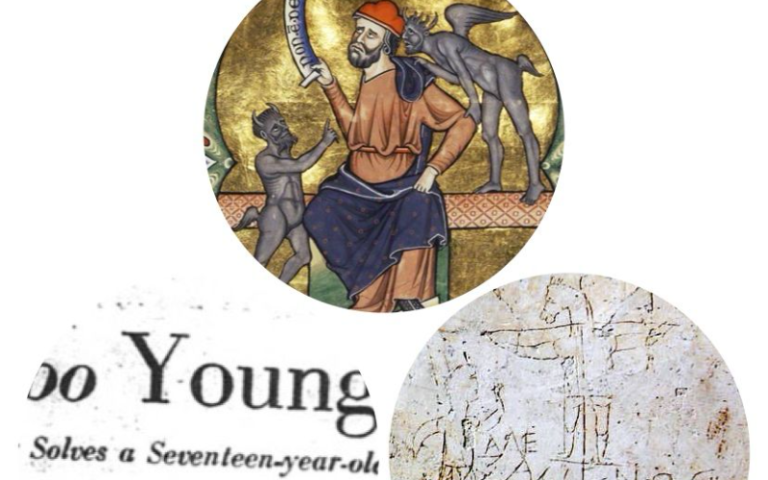Social Media in History: Alumni Event
21 May 2024, 6:30 pm–9:00 pm

UCL History invites members of our alumni community, staff and current students to this roundtable discussion on Social Media in History.
This event is free.
Event Information
Open to
- UCL staff | UCL students | UCL alumni
Availability
- Yes
Cost
- Free
Organiser
-
Queenie Lee
Dr Antonio Sennis: Gossip in Medieval Europe
In the Middle Ages, just as today, gossip was considered an idle practice, a malicious habit that could endanger the peaceful coexistence of the members of a community and cause the corruption of the lives of individuals. However, gossip can indeed be analysed by historians as one of the tools that communities had at their disposal to maintain the unity, morals and values of their members. Gossip could also serve as a tool of social control, as it allowed the group as a whole to select leaders and control competing cliques and ambitious individuals among those cliques. Moreover, in the Middle Ages just as today, gossip was a culturally controlled game, with very important social functions. It could mark a group off from other groups. It could also eventually turn into scandal, aimed at demonstrating who was not worthy to be member of the group.
Dr Benet Salway: Gossip, rumour, and fake news in the Roman empire
Even without the advantages of print or electronic media, to judge from our literary sources, the Roman world was rife with gossip and rumour. Just as in today’s social media much of this spread in intangible or perishable forms that are now lost to us. However, this does not mean that we should underestimate their power. Indeed we can only understand some official public pronouncements as responses to popular rumours and conspiracy theories. Conversely, we also find examples of the Roman state organs propagating fake news for political purposes.
Dr Rebecca Jennings: Problem and letters pages in twentieth-century Britain
The proliferation of print media in the early and mid-twentieth century, catering to an increasingly diverse and niche readership, offered new opportunities for readers to share their experiences and thoughts with a community of other readers. In the interwar period, the expansion in readership of the national press and the emergence of a new and popular genre of women’s magazines, provided a space for readers to consult with ‘agony aunts’ about personal dilemmas in a public forum. By the 1960s and 1970s, the first British magazines aimed at a lesbian and trans readership were being produced and their letters pages enabled early attempts to forge a sense of shared identity amongst their readers in the context of considerable isolation and social taboos. This talk with explore how changing ideas about the ‘self’ and the increasing influence of psychological language and approaches encouraged individuals to reflect on their own feelings and share their private experiences with others, reshaping wider notions of gender and sexuality in the process.
Lecture: G6 Archaeology Lecture Theatre (18:30-19:30)
Reception: Archaeology Common Room (19:30-20:30)
About the Speakers
Dr Benet Salway
Senior lecturer in Roman History at UCL
Benet Salway's broad area of interest is the Roman world from the late republic until late antiquity. The particular focuses of his research are later Roman history, Greek and Roman epigraphy and onomastics, Roman law, and travel and geography in the Graeco-Roman world. He teaches undergraduate courses on the Roman Empire and the Roman Army, and postgraduate courses on Latin Epigraphy and aspects of late antiquity.
More about Dr Benet SalwayDr Antonio Sennis
Associate Professor of Medieval History at UCL
Antonio Sennis is Associate Professor of Medieval History. He is a cultural historian whose main focus is Western Europe in the period 800-1200. He has worked on: space and memory as ideological tools in medieval Europe; the relationship between power and territory in early medieval Western Europe; the medieval Papacy; monastic lordships in medieval Italy; medieval monasteries and their chronicles; the memory of origins and the construction of identities in European monastic institutions. Antonio is currently studying the development of concepts of fame and reputation in medieval Europe.
Antonio is now the Head of Department for UCL History (2023- ).
More about Dr Antonio SennisDr Rebecca Jennings
Lecturer in Modern History at UCL
Rebecca teaches on the history of gender and sexuality in modern Britain. Her research focuses on twentieth-century British and Australian lesbian history and she is the author of Tomboys and Bachelor Girls: A lesbian history of post-war Britain (2007); A Lesbian History of Britain: Love and sex between women since 1500 (2007); and Unnamed Desires: A Sydney lesbian history (2015). Rebecca is currently completing a monograph arising from her Australian Research Council-funded research into 'Lesbian Practices of Intimacy in Britain and Australia, 1945-2010', which traces lesbian relationship models and parenting practices in post-war Britain and Australia.
More about Dr Rebecca Jennings Close
Close

